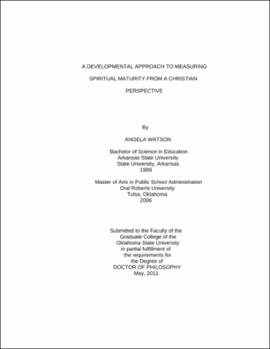| dc.contributor.advisor | Fuqua, Dale R. | |
| dc.contributor.author | Watson, Angela | |
| dc.date.accessioned | 2013-11-26T08:35:00Z | |
| dc.date.available | 2013-11-26T08:35:00Z | |
| dc.date.issued | 2011-05 | |
| dc.identifier.uri | https://hdl.handle.net/11244/7620 | |
| dc.description.abstract | Scope and Method of Study: Although broad measures have revealed relationships between spirituality and other psychological variables, the exact nature of these remains unclear. Further, many measures fail to consider values significant to practitioners of faith and of psychology. The purpose of this study was to formulate a measure of spiritual maturity that took into account both the beliefs of Christian participants and indices of behavioral health considered important to secular psychologists. Employing the expertise of two sets of subject matter experts, first to construct items and then to evaluate their face validity, resulted in 42 items comprising two subscales of the new Christian Maturity scale based upon Clairvaux (n.d.): Loving God for Self's Sake and Loving God for God's Sake. The items were administered along with multiple construct validity indicators to 541 young adults enrolled in a private Christian university. | |
| dc.description.abstract | Findings and Conclusions: Item analysis revealed large inter-item correlations. Ten items were retained for each of the two subscales, yielding good internal consistency coefficients. Principal axis factor analysis with direct oblimin rotation resulted in two uncorrelated factors that well represented the theorized dimensions of Christian spiritual maturity. Small to moderate correlations in the expected directions with other measures of spiritual maturity, subjective wellbeing, beliefs, and ego identity status supported the construct validity of the subscales. Analyses of variance indicated that there were differences between theology majors and non-majors on the subscale, Step 2: Loving God for Self's Sake, with theology majors identifying substantially fewer extrinsic, or instrumental, reasons motivating their love for God than did their non-major counterparts. There were no significant differences between theology major and non-major means on the subscale, Step 3: Loving God for God's Sake. All participants scored lower on the Step 2 subscale and higher on the Step 3 subscale. Test-retest was moderate for Step 2 but lower for Step 3, possibly lending empirical support for the theoretical framework, which postulates that Step 3 is a higher developmental level and thus a less stable construct in this type of maturing sample of young adults. Limitations and implications for future study were discussed. | |
| dc.format | application/pdf | |
| dc.language | en_US | |
| dc.rights | Copyright is held by the author who has granted the Oklahoma State University Library the non-exclusive right to share this material in its institutional repository. Contact Digital Library Services at lib-dls@okstate.edu or 405-744-9161 for the permission policy on the use, reproduction or distribution of this material. | |
| dc.title | Developmental approach to measuring spiritual maturity from a Christian perspective | |
| dc.contributor.committeeMember | Montgomery, Diane | |
| dc.contributor.committeeMember | Cho, YoonJung | |
| dc.contributor.committeeMember | Foubert, John D. | |
| osu.filename | Watson_okstate_0664D_11383.pdf | |
| osu.accesstype | Open Access | |
| dc.type.genre | Dissertation | |
| dc.type.material | Text | |
| dc.subject.keywords | beliefs | |
| dc.subject.keywords | christian maturity | |
| dc.subject.keywords | development | |
| dc.subject.keywords | ego identity | |
| dc.subject.keywords | measurement | |
| dc.subject.keywords | subjective well-being | |
| thesis.degree.discipline | Educational Psychology | |
| thesis.degree.grantor | Oklahoma State University | |
